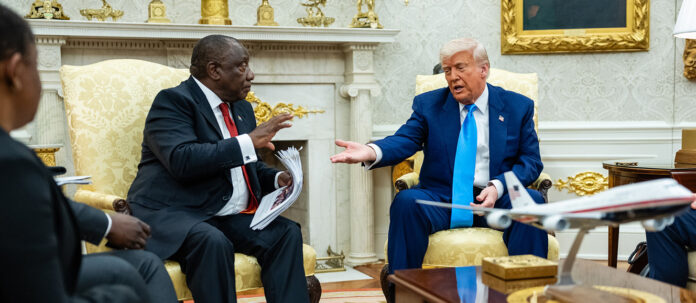The United States has reversed course at the last minute, partially easing its boycott of this weekend’s G20 Summit in South Africa.
After initially planning to withdraw entirely, the US Embassy informed Pretoria that a small delegation will attend only the closing day of the meeting on November 23, when South Africa formally hands over the G20 presidency. The US will still boycott all opening-day proceedings.
Acting Ambassador and Chargé d’Affaires, a.i., Marc D. Dillard will lead the pared-down delegation. In a diplomatic note, the embassy confirmed Dillard’s participation exclusively in the summit’s final session and requested accreditation for the US team.
White House Press Secretary Karoline Leavitt clarified that the United States is not participating in the summit’s official talks, stressing the strictly limited nature of the attendance.
Spin doctor slams Ramaphosa
She also criticised President Cyril Ramaphosa’s recent comments about the United States, saying his remarks were “not appreciated”.
According to Leavitt, the ambassador’s presence is “simply” to acknowledge that the United States will host the G20 next year and to receive the ceremonial handover.
Ramaphosa alluded to deliberations with the US regarding their participation. Ramaphosa made this announcement during a European Union leaders’ event at the Sandton Convention Centre on Thursday evening.
He also emphasised the ineffective nature of boycotts and, in an earlier speech, also took a veiled swipe at Trump during his closing remarks at the G20 Social Summit.
“It cannot be that a country’s geographical location or income level or army determines who has a voice, and who is spoken down to. This means that there should be no bullying of one nation by another nation. We are all equal.”
The US delegation includes plenary delegates Stephanie Bunce, Ariana Sailer, Rubani Trimiew, and Jeffrey Ladenson. Viewing-room delegates include Victoria King, David Schneider, and Heather Wright, who will have access to the media centre.
Washington’s partial boycott stems from President Trump’s longstanding criticism of South Africa’s government. He has repeatedly claimed, without evidence, that white South Africans face discriminatory treatment, a view that influenced his decision to pull back from the summit.
Trump ambushes Ramaphosa
This led to Trump ambushing Ramaphosa during his visit to the White House in May.
Trump had also reportedly hoped to prevent South Africa from issuing a joint statement at the conclusion of the two-day event.
Speaking at the American Business Forum in Miami two weeks ago, Trump argued that South Africa “shouldn’t even be in the G’s anymore,” adding: “I’m not going … I’m not going to represent our country there. It shouldn’t be there.”
In February, Trump signed an executive order directing US agencies to assist with the resettlement of white South African farmers, whom he described as victims of “unjust racial discrimination” and to reduce aid to Pretoria.



